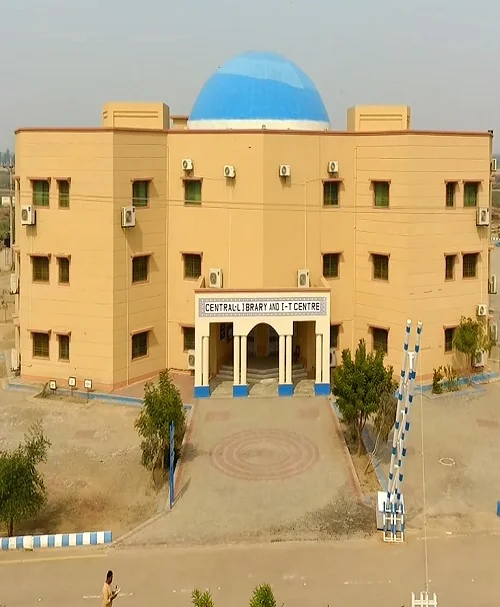Research Policy
The Office of Research, Innovation, and Commercialization (ORIC) at People's University of Medical and Health Sciences for Women (PUMHSW), SBA, has been established to promote a robust research culture within the university. This policy outlines the framework, objectives, and guidelines for conducting and supporting research activities at PUMHSW, ensuring they align with national and international standards.
Objectives
The primary objectives of the ORIC research policy are:
1. Enhancement of Research Capacity: To develop and enhance the research capabilities of faculty, staff, and students by providing the necessary resources, training, and infrastructure.
2. Promotion of Innovation: To foster a culture of innovation and creativity, encouraging the development of new ideas and solutions in the field of medical and health sciences.
3. University-Industry Linkages: To establish strong linkages between the university and industry, facilitating the commercialization of research outcomes.
4. Ethical Research Practices: To ensure that all research conducted under the university’s auspices adheres to the highest ethical standards.
5. Dissemination of Knowledge: To promote the dissemination of research findings through publications, conferences, and collaborations.
Research Governance
The governance of research at PUMHSW is structured to ensure accountability, quality, and strategic alignment with the university’s mission. Key elements include:
• Research Advisory Board: A board comprising senior researchers, industry experts, and academic leaders to provide strategic direction and oversight.
• Research Committees: Specialized committees to review and approve research proposals, ensuring they meet ethical and scientific standards.
Research Funding
ORIC is committed to securing and managing funding for research through:
• Internal Grants: Allocating university funds to support promising research projects.
• External Grants: Assisting researchers in identifying and applying for external funding from national and international agencies.
• Industry Partnerships: Facilitating partnerships with industry stakeholders to co-fund research initiatives.
Research Areas and Priorities
The research policy prioritizes areas that align with national health challenges and global scientific trends. Key priority areas include:
• Clinical Research: Focusing on developing new treatments and improving patient care.
• Public Health: Addressing community health issues and preventive care strategies.
• Biomedical Sciences: Exploring fundamental biological processes and their implications for health.
• Health Technology: Innovating in medical devices, diagnostics, and healthcare IT solutions.
Commercialization and Innovation
ORIC is dedicated to translating research findings into practical applications. Strategies include:
• Intellectual Property Management: Supporting researchers in protecting their intellectual property through patents and copyrights.
• Technology Transfer: Facilitating the transfer of technology from the lab to the market.
• Startups and Spin-offs: Encouraging the creation of startups based on university research and providing incubation support.
Capacity Building
To build research capacity, ORIC will:
• Training Programs: Offer workshops, seminars, and training programs on research methodologies, grant writing, and ethical practices.
• Mentorship: Establish mentorship programs pairing junior researchers with experienced mentors.
• Research Facilities: Continuously upgrade and maintain state-of-the-art research facilities and laboratories.
Ethical Standards
Maintaining high ethical standards in research is paramount. ORIC ensures this through:
• Ethics Review Board: A board responsible for reviewing and approving research proposals to ensure ethical compliance.
• Ethics Training: Mandatory training for all researchers on ethical issues and standards in research.
Monitoring and Evaluation
To ensure the effectiveness of the research policy, ORIC will implement:
• Regular Assessments: Conduct periodic reviews of research projects and outcomes.
• Impact Analysis: Evaluate the impact of research on society, industry, and the academic community.
• Feedback Mechanism: Establish channels for feedback from researchers and stakeholders to continuously improve the research environment.
Conclusion
The ORIC research policy at PUMHSW, SBA, is designed to create a dynamic and supportive environment for medical and health sciences research. By promoting innovation, ensuring ethical standards, and facilitating the commercialization of research, ORIC aims to contribute significantly to the advancement of medical knowledge and the betterment of society.
Objectives
The primary objectives of the ORIC research policy are:
1. Enhancement of Research Capacity: To develop and enhance the research capabilities of faculty, staff, and students by providing the necessary resources, training, and infrastructure.
2. Promotion of Innovation: To foster a culture of innovation and creativity, encouraging the development of new ideas and solutions in the field of medical and health sciences.
3. University-Industry Linkages: To establish strong linkages between the university and industry, facilitating the commercialization of research outcomes.
4. Ethical Research Practices: To ensure that all research conducted under the university’s auspices adheres to the highest ethical standards.
5. Dissemination of Knowledge: To promote the dissemination of research findings through publications, conferences, and collaborations.
Research Governance
The governance of research at PUMHSW is structured to ensure accountability, quality, and strategic alignment with the university’s mission. Key elements include:
• Research Advisory Board: A board comprising senior researchers, industry experts, and academic leaders to provide strategic direction and oversight.
• Research Committees: Specialized committees to review and approve research proposals, ensuring they meet ethical and scientific standards.
Research Funding
ORIC is committed to securing and managing funding for research through:
• Internal Grants: Allocating university funds to support promising research projects.
• External Grants: Assisting researchers in identifying and applying for external funding from national and international agencies.
• Industry Partnerships: Facilitating partnerships with industry stakeholders to co-fund research initiatives.
Research Areas and Priorities
The research policy prioritizes areas that align with national health challenges and global scientific trends. Key priority areas include:
• Clinical Research: Focusing on developing new treatments and improving patient care.
• Public Health: Addressing community health issues and preventive care strategies.
• Biomedical Sciences: Exploring fundamental biological processes and their implications for health.
• Health Technology: Innovating in medical devices, diagnostics, and healthcare IT solutions.
Commercialization and Innovation
ORIC is dedicated to translating research findings into practical applications. Strategies include:
• Intellectual Property Management: Supporting researchers in protecting their intellectual property through patents and copyrights.
• Technology Transfer: Facilitating the transfer of technology from the lab to the market.
• Startups and Spin-offs: Encouraging the creation of startups based on university research and providing incubation support.
Capacity Building
To build research capacity, ORIC will:
• Training Programs: Offer workshops, seminars, and training programs on research methodologies, grant writing, and ethical practices.
• Mentorship: Establish mentorship programs pairing junior researchers with experienced mentors.
• Research Facilities: Continuously upgrade and maintain state-of-the-art research facilities and laboratories.
Ethical Standards
Maintaining high ethical standards in research is paramount. ORIC ensures this through:
• Ethics Review Board: A board responsible for reviewing and approving research proposals to ensure ethical compliance.
• Ethics Training: Mandatory training for all researchers on ethical issues and standards in research.
Monitoring and Evaluation
To ensure the effectiveness of the research policy, ORIC will implement:
• Regular Assessments: Conduct periodic reviews of research projects and outcomes.
• Impact Analysis: Evaluate the impact of research on society, industry, and the academic community.
• Feedback Mechanism: Establish channels for feedback from researchers and stakeholders to continuously improve the research environment.
Conclusion
The ORIC research policy at PUMHSW, SBA, is designed to create a dynamic and supportive environment for medical and health sciences research. By promoting innovation, ensuring ethical standards, and facilitating the commercialization of research, ORIC aims to contribute significantly to the advancement of medical knowledge and the betterment of society.






